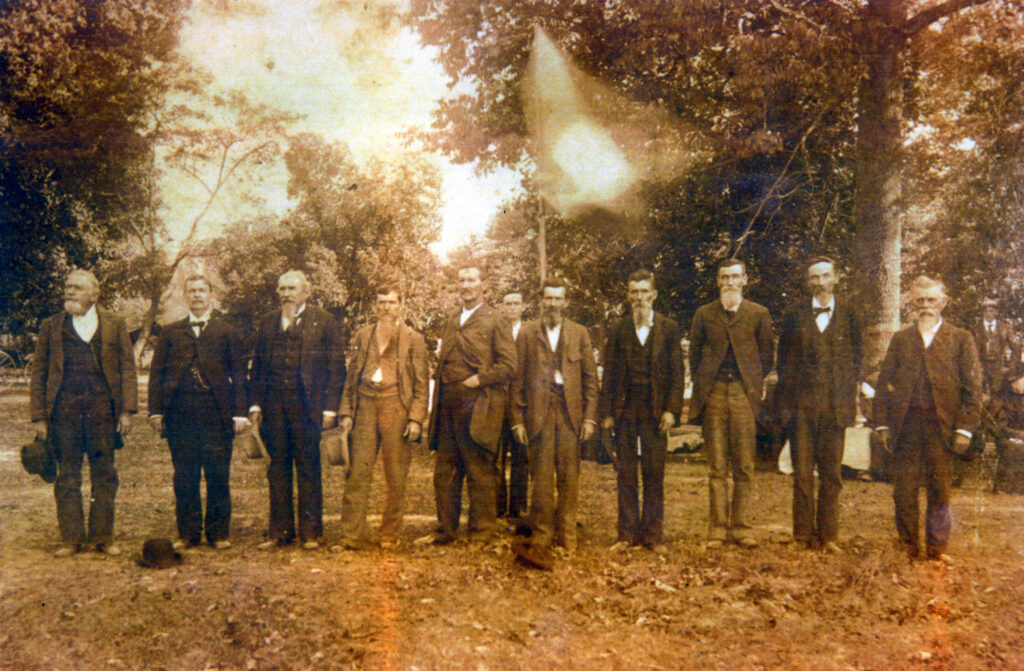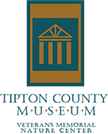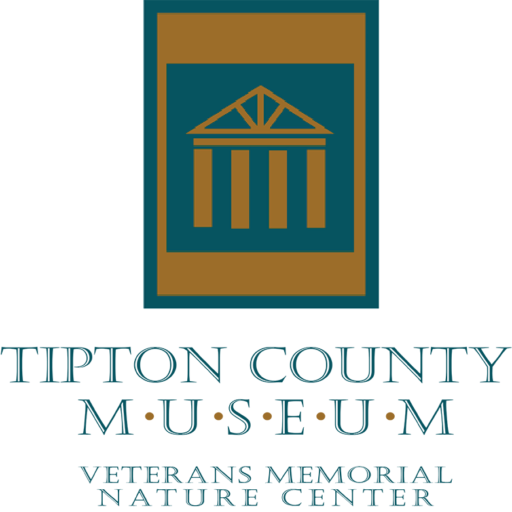As printed in The Commercial Appeal, July 27, 1894
Veterans Greeted Each Other
Assemblage was the largest yet had since the organization of the association – speeches made by men who were in the thickest of the fray
The twentieth annual reunion of the Confederate Veterans of West Tennessee was held at Brighton yesterday.
There were special trains from both directions and thousands of people came in wagons, buggies on horseback and on foot until the beautiful woods that covered the reunion ground were thronged for a mile up and down the creek, both above and below the “big spring.”
Not one in ten could get a seat or even find standing room within hearing of the speaker’s voice, but all were happy. In all that vast throng there was not a harsh or ugly word heard.
The band played “Dixie,” and the throng crowed about the speaker’s stand. There were loud call for Judge Greer, Gen Vaughan and others, who wedged their way through the crowd as soon as they could. Col. Sandford, the president of the association, conducted the exercises. Col. W. W. Tansil was called on for an address. He expressed his willingness to make a speech, but, like the young convert who was called on to pray, he said he could not find the words.
Col. A. J. Vaughan of Memphis was the next speaker. He expressed his pleasure in being present to shake hands with the old comrades.
The speeches were interspersed with music by the Brighton band, which added greatly to the pleasure of the gathering.

Col. Sanford was especially happy in his introductions. He held high in his hand a sheet of paper, yellow with age, which proved to be a furlough which was issued to a soldier in Gen. Lee’s army. Col. Sanford told of a boy 19 years old who enlisted and served three years and three days, a comrade approached him and wanted to buy his furlough, offering $1,000 therefor. The soldier was Gus Waddell of District Fifteen. After the band played, Mr. Waddell made a brief address, expressing his pleasure at being present.
Judge J. M. Greer of Memphis was the next speaker. He was eloquent and patriotic in his address, moving his hearers to tears.
In introducing the speaker, Col. Sanford told how the cadets of the Academy of Virginia had laid down their books and taken up their guns in defense of their principles. Judge Greer was one of these and met his first engagement at the battle of New Market.
In commencing, Judge Greer said he scarcely felt worthy to call his hearers comrades, who had served four years, as he was only a boy of 16 when he entered. Then followed the address of the day.
Referring to the Stars and Bars, Judge Greer said that it now served to prove American valor. Its only stain, the blood of heroes, shed to give it life, “Dixie” they had failed to make national, but they had done more, they had made it immortal.
The speaker paid high tribute to American valor and patriotism, whether under stars and stripes or stars or bars. “It is an intense and glorious power,” he said, and he would teach that if they wished to keep alive the greatness of the country they must think less of self and more of it.
Reunions were not alone to keep green the memory of comrades who have gone, nor yet to greet those here, but to impress the lesson of American patriotism, whether one rode with Forrest or Sheridan. The address closed with a beautiful tribute to the soldiers.
Judge William S. McCain, a native of Tipton county, Tenn., but now of Little Rock, was happily introduced by the president. He made a reminiscent talk, telling of the time when he was a school boy and afterward teacher in a little log schoolhouse over the hill. He told how during the war he drilled the boys in military fashion. He was glad, however, that they had not been compelled to go to the war. He honored the veterans because of their valor, but he was glad that it was their privilege to live for their country as well as to die for it.
Mr. Waterman of Memphis was then asked to give the bugle calls. He was a bugler in Forrest’s command and gave the several calls known so well to the soldiers.
Then came dinner. Everybody had brought baskets full of good things and there were pigs and lambs galore barbecued for the occasion. Col. Sanford invited the Memphis delegation to dine with him, which they did, and they fared sumptuously on barbecued meats and chicken, with dessert of cakes and pies.
All over the grounds they were happy groups gathered around loads of good things. All feasted abundantly and yet there were many baskets full left.
It was a happy gathering. Hard times were not there, for the old soldiers and their families from thrifty and prosperous homes had gathered to greet one another and each to learn of the other how good it is to be alive and well in the glorious State of Tennessee.
In the afternoon, the old soldiers, both of the blue and the gray, were invited to meet in the schoolhouse. There those who were not already enrolled gave their names, after which the business of the reunion was entered upon.
Col. Sanford, the president, said in opening the meeting that it was the most successful reunion ever held. It wasn’t only a soldiers’ reunion, but a people’s reunion, led by the soldiers. These reunions wiped out all differences in districts and counties and all met on one common plane of humanity and he was thankful that the ex-Confederates lead on the occasion in progress.
The purpose of the Confederate executive committee is to erect a monument to the Confederate dead in Covington. It has been decided to have a large granite pedestal 13 feet high. On it will be in hammered bronze the figure of a Confederate soldier. The one chosen will be a cavalryman with drawn sword, as though ready to engage in combat. This will be placed in the courthouse yard, facing the principal street. The monument will cost $2,000. Of this amount the following sums have been collected:
In the hand of the treasurer, $889; Winnford bequest, $250; Covington, $100; County Court, $100; Geo. D. Holmes, $105; the Beethovens, $32.20; the Coxies, $4,00; Capt. Wood, $10; the Minstrels, $75; the Nineteenth Century Club, $50; G. W. Simonton, $225; total, $1,850.20.
Ex-Gov. Bob Taylor will deliver a lecture at Covington soon, the proceeds of which will go to the monument fund.
Col. Sanford said the artist had sent some pictures to show what the monument was to be like. The one selected was the figure of Gen. Stewart.
There was a vote of thanks tendered to Mr. Crofford, the treasurer, for the faithful work done.
Mr. Williamson of Memphis, offered a vote of thanks to the Confederates of Tipton county for the excellent entertainment tendered. The Memphis delegation adopted the resolution by a rising vote.
The “Confederate Veteran” of Nashville was made the organ of the Tipton County Veterans.
All the officers of the association were re-elected.
The meeting was about to adjourn when Mr. Williams, of Memphis, arose and said he had seen more fine looking old soldiers than ever before; there were about eight acres of handsome women and any amount of fat mules and other good stock. His remarks elicited rounds of applause and the president remarked that a motion to make Mr. Williams the orator would be entertained.
The setting of the day for the next reunion was left for the committee.
The veterans then wandered at will, greeting old friends that they had not seen for a year.
The committee to whom much of the pleasure of the reunion was due was composed of Col. Wm. Sanford, the president of the association, C. B. Simonton, N. W. Baptist, Joseph Forsythe, J. N. Green, G. O. Holmes and D. A. Merrill.
The officers of the association are: Col. Sanford, president; Joseph Forsythe, vice-president; J. U. Green, secretary, and John A. Clifford* [sic], treasurer. (*Should be Crofford)
After the business meeting at the schoolhouse the throng was assembled again about the stand, and Capt. J. Harvey Mathes of Memphis addressed the audience for twenty minutes. He spoke as only a soldier can speak who has led the van in the thickest of the fight, and his speech was warmly applauded by his hearers. There is not a braver soldier survives the war than Capt. Mathes, and none who has more to show where he was.
Among the veterans assembled yesterday there was one who was in “Hood’s retreat,” who was especially honored. It was Jim Hill, a colored man.
He was discovered in a peculiar way. There is an estate in Tipton county that belongs to Col. Dodge. Col Sanford is agent for the property and has sold several tracts. Among the purchasers was Jim Hill. Jim made a small payment and executed a series of notes and mortgages to secure the owner. Things went well until the short crops and hard times struck him. Col. Sanford was as lenient with him as the owners of the property would allow. Jim called on Col. Sanford several times. Finally he was told that the end had come, and that the mortgage would have to be foreclosed. Jim was sitting in front of the fire in a meditative mood. Occasionally he would give the coals a pole and give vent to deep sighs.
“Dese am sho’ hard times,” he soliloquised. “Fo’ God, colonel, dey is de hardes’ times I’s seen since Hood’s retreat.”
“Hood’s retreat,” said Col. Sanford. “What do you know about Hood’s retreat? Were you there?”
“I sho’ was, dat’s de reason I’s heah. I was wid my young massa, and at Hood’s retreat I got lost from him and couldn’t find him any mo.”
“Jim, said Col. Sanford,” if you were in Hood’s retreat, you are all right. Go home and stay on your land and pay for it when you can.”
Col. Dodge seconded the action of Co. Sanford, and told him never to trouble “Hood’s retreat.”

